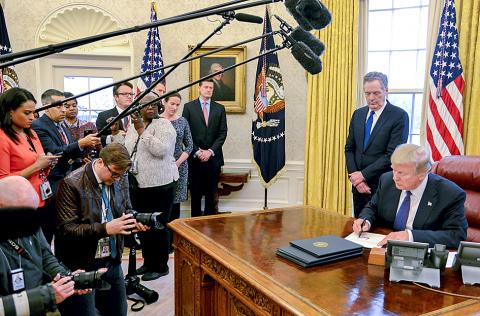The US subsidiary of South Korea’s LG Electronics Co on Wednesday warned retailers that it would raise prices of its washing machines following import duties imposed by US President Donald Trump’s administration this week.
It was the first concrete reaction to the trade measures announced this week that have angered the US’ trading partners.
“As a result of the trade situation, we will be initiating pricing actions,” LG Electronics USA executive vice president of home appliances Thomas Yoon said in a letter to retailers.

Photo: Bloomberg
He said the amount of the price increases would be detailed in separate letters to the stores.
The Wall Street Journal reported that the price hike would be about US$50 on certain washer-dryer combinations.
Trump on Tuesday put his “America First” doctrine into action by imposing duties of 20 to 50 percent on large washing machines manufactured in China, South Korea, Mexico and Vietnam, in addition to a 30 percent tariff on imported solar panels.
Seoul has said it plans to take the issue to the WTO, while Beijing expressed “strong dissatisfaction” with the move adopted to protect US manufacturers. However, LG assured its retailers that supplies of the appliances would not be disrupted.
“While this is disappointing news, let me assure you that we have planned for this possibility so we can minimize any disruption in supply of LG washers and dryers to you, our valued partners,” Yoon wrote.
The South Korean company recently completed construction of a washing machine factory in Clarksville, Tennessee, which it expects to start production in the fourth quarter.
Separately, after imposing tariffs opposed by much of the US solar industry, the Trump administration is offering a US$3 million prize to revive domestic solar manufacturing.
The US Department of Energy on Wednesday said that the American Made Solar Prize would help “reassert American leadership in the solar marketplace.”
Earlier this week, Trump decided to impose tariffs of up to 30 percent on most imported solar cells used in solar panels.
A federal trade panel recommended the tariffs, which had been sought by two US manufacturers.
Most of the US solar industry revolves around installing solar systems for homeowners and utilities, and those companies have largely opposed the tariffs.
They have said that tariffs would raise their costs and make photovoltaic installations less price-competitive with other energy sources.
Additional reporting by AP

Intel Corp chief executive officer Lip-Bu Tan (陳立武) is expected to meet with Taiwanese suppliers next month in conjunction with the opening of the Computex Taipei trade show, supply chain sources said on Monday. The visit, the first for Tan to Taiwan since assuming his new post last month, would be aimed at enhancing Intel’s ties with suppliers in Taiwan as he attempts to help turn around the struggling US chipmaker, the sources said. Tan is to hold a banquet to celebrate Intel’s 40-year presence in Taiwan before Computex opens on May 20 and invite dozens of Taiwanese suppliers to exchange views

Quanta Computer Inc (廣達) chairman Barry Lam (林百里) is expected to share his views about the artificial intelligence (AI) industry’s prospects during his speech at the company’s 37th anniversary ceremony, as AI servers have become a new growth engine for the equipment manufacturing service provider. Lam’s speech is much anticipated, as Quanta has risen as one of the world’s major AI server suppliers. The company reported a 30 percent year-on-year growth in consolidated revenue to NT$1.41 trillion (US$43.35 billion) last year, thanks to fast-growing demand for servers, especially those with AI capabilities. The company told investors in November last year that

Application-specific integrated circuit designer Faraday Technology Corp (智原) yesterday said that although revenue this quarter would decline 30 percent from last quarter, it retained its full-year forecast of revenue growth of 100 percent. The company attributed the quarterly drop to a slowdown in customers’ production of chips using Faraday’s advanced packaging technology. The company is still confident about its revenue growth this year, given its strong “design-win” — or the projects it won to help customers design their chips, Faraday president Steve Wang (王國雍) told an online earnings conference. “The design-win this year is better than we expected. We believe we will win

United Microelectronics Corp (UMC, 聯電) forecast that its wafer shipments this quarter would grow up to 7 percent sequentially and the factory utilization rate would rise to 75 percent, indicating that customers did not alter their ordering behavior due to the US President Donald Trump’s capricious US tariff policies. However, the uncertainty about US tariffs has weighed on the chipmaker’s business visibility for the second half of this year, UMC chief financial officer Liu Chi-tung (劉啟東) said at an online earnings conference yesterday. “Although the escalating trade tensions and global tariff policies have increased uncertainty in the semiconductor industry, we have not